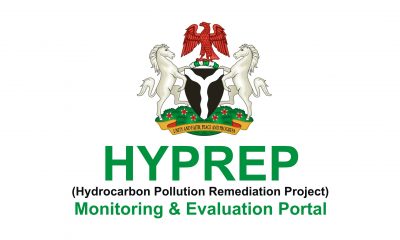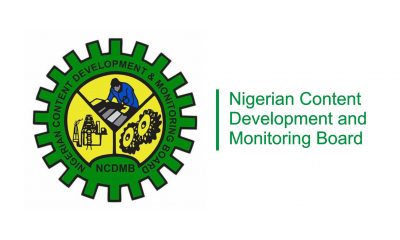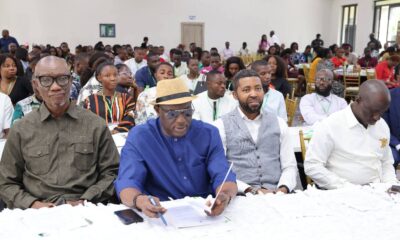Opinion
Ridding Civil Service Of Corruption
Corruption means “dishonest or illegal behaviour, especially of people in authority, or the act of making somebody change from moral to immoral standards of behaviour”.
The world “corruption” is as old as mankind. So we need not bother ourselves about its origin. The area of concern should be its spread in dimension in different parts of the world at various times.
In Nigeria context, corruption has been so institutionalized that many Nigerians, either by act of omission or commission, have come to see corruption as a way of life. This is with the effect that corruption has grown into a full blown cancer which has spread and eaten deep into the fabric of the nation’s socio-economic and political strata.
Corruption has dehumanized and debilitated us as a people so much so that the image of an average Nigerian is badly battered within and outside Nigeria. It is now common place to hear average Nigerians talk about “the Nigerian factor” which has become an alias for corruption.
The situation is so bad that it may not be wrong for anybody to assume that corruption is an official policy in both public and private sectors in Nigeria. That is why, the poverty level with its attendant widespread disease, hunger and low life expectancy is at its highest in Nigeria.
People erroneously tend to associate corruption with public office holders only. This is not so, because corruption, being a state of the mind, does not recognize public or private sector. Take the act of bribery for instance, it is not limited to the public sector. A person from the private sector who offers bribe to the public officer is as guilty as the receiver.
Basically, corruption takes the form of the following: bribery, nepotism, extortion, gratification, absenteeism from work, misappropriation, embezzlement and stealing or looting. It includes inflation of contract value, falsification of ‘official record, ghost workforce, examination malpractices, hoarding, bunkering, smuggling, admission racketeering, diversion of funds etc.
The effects of corruption are deadlier and more dangerous than HIV/AIDS. This is because HIV/AIDS only kills an individual, whereas corruption kills a nation. Corruption has the capacity to breed all kinds of vices and societal degeneration. It brings about poverty, diseases and social insecurity. The infrastructural and security problems we have in the country today are also borne out of corruption.
Corruption is so pervasive that it affects all sectors of the economy, especially the public service, the organized private sector, civil societies and even religious organisations.
Lack of policy implementation and policy inconsistency are products of political corruption. While religious organisations are neck deep in monetization, the proliferation of civil societies in Nigeria has become an avenue to attract international donors. These are all off-shoots of corruption.
Corruption literarily is synonymous with lack of development and progress because by breeding and feeding on inefficiency, it generally strangles the system of social organisation.
For instance, corruption increases the cost of doing business because of the attendant red-tapism, unnecessary bureaucracy, kickbacks and gratification involved. The totality of these escalates the cost of living beyond the reach of ordinary Nigerians, hence the society becomes poverty-stricken.
Similarly, corruption creates breeding ground for lack of transparency and wanton abuse of office. Government businesses are conduted as business as usual, money exchanges hands with reckless abandon as the ‘smart’ and crooks dominate influential positions and further saturate the system with unqualified, incompetent and dubious cronies and relations.
Now, how can we remedy the situation? Successive administrations in Nigeria, in an attempt to grapple with the problems of corruption, have put in place various policies to combat it, but the successful implementation of such policies remains an albatross.
We have had such policies like War Against Indiscipline (WAI) during the Buhari/Idiagbon regime. The administration of former President Olusegun Obasanjo had to its credit the establishment of two anti-graft agencies namely: Independent Corrupt Practices and other Related Offences Commission (ICPC) and Economic and Financial Crimes Commission (EFCC). This bold step was one of the highest points of Obasanjo’s administration between 1999 and 2007.
Shortly before the creation of ICPC, Nigeria was rated the second most corrupt country in the world by the Transparency International; but with the advent of ICPC, the corruption index of Nigeria improved immensely. Since its creation, the commission has received over 5,000 petitions, prosecuted many of them and secured convictions in a good number of cases.
It is in its effort to get everybody involved in the war against corruption that the commission created the National Anti-Corruption Volunteer Corp (NAVAC) and the Anti-Corruption and Transparency Units (ACTU).
The NAVAC is the platform where the commission enlists honest and credible Nigerians who are passionate about the war against corruption to contribute their quota to rid Nigeria of corrupt practices. The ACTU, on the other hand, is a monitoring unit established by the commission in the Ministries, Departments and Agencies (MDAs) of government at the federal, State and local government levels. Members of the ACTU are career civil servants who have distinguished themselves in the area of discipline, transparency and credibility.
The war against corruption in Nigeria will make more meaning if civil servants are actively involved. This is because the civil service is the engine room of government’s policies. A corrupt civil service is tantamount to poor policy implementation and poor service delivery.
I, therefore, urge the civil servants in the country to join the war against corruption by enlisting in NAVAC and more importantly by establishing ACTU in all the State Ministries, Departments and Agencies (MDAs).
Markson is a student of Port Harcourt Polytechnic, Rumuola.
Opinion
Why Reduce Cut-Off Mark for C.O.E ?
Opinion
Welcome! Worthy Future For R/S
Opinion
Restoring Order, Delivering Good Governance
The political atmosphere in Rivers State has been anything but calm in 2025. Yet, a rare moment of unity was witnessed on Saturday, June 28, when Governor Siminalayi Fubara and Minister of the Federal Capital Territory, Chief Nyesom Wike, appeared side by side at the funeral of Elder Temple Omezurike Onuoha, Wike’s late uncle. What could have passed for a routine condolence visit evolved into a significant political statement—a symbolic show of reconciliation in a state bruised by deep political strife.
The funeral, attended by dignitaries from across the nation, was more than a moment of shared grief. It became the public reflection of a private peace accord reached earlier at the Presidential Villa in Abuja. There, President Bola Ahmed Tinubu brought together Governor Fubara, Minister Wike, the suspended Speaker of the Rivers State House of Assembly, Martin Amaewhule, and other lawmakers to chart a new path forward.
For Rivers people, that truce is a beacon of hope. But they are not content with photo opportunities and promises. What they demand now is the immediate lifting of the state of emergency declared in March 2025, and the unconditional reinstatement of Governor Fubara, Deputy Governor Dr. Ngozi Odu, and all suspended lawmakers. They insist on the restoration of their democratic mandate.
President Tinubu’s decision to suspend the entire structure of Rivers State’s elected leadership and appoint a sole administrator was a drastic response to a deepening political crisis. While it may have prevented a complete breakdown in governance, it also robbed the people of their voice. That silence must now end.
The administrator, retired naval chief Ibok-Ette Ibas, has managed a caretaker role. But Rivers State cannot thrive under unelected stewardship. Democracy must return—not partially, not symbolically, but fully. President Tinubu has to ensure that the people’s will, expressed through the ballot, is restored in word and deed.
Governor Fubara, who will complete his six-month suspension by September, was elected to serve the people of Rivers, not to be sidelined by political intrigues. His return should not be ceremonial. It should come with the full powers and authority vested in him by the constitution and the mandate of Rivers citizens.
The people’s frustration is understandable. At the heart of the political crisis was a power tussle between loyalists of Fubara and those of Wike. Institutions, particularly the State House of Assembly, became battlegrounds. Attempts were made to impeach Fubara. The situation deteriorated into a full-blown crisis, and governance was nearly brought to its knees.
But the tide must now turn. With the Senate’s approval of a record ?1.485 trillion budget for Rivers State for 2025, a new opportunity has emerged. This budget is not just a fiscal document—it is a blueprint for transformation, allocating ?1.077 trillion for capital projects alone. Yet, without the governor’s reinstatement, its execution remains in doubt.
It is Governor Fubara, and only him, who possesses the people’s mandate to execute this ambitious budget. It is time for him to return to duty with vigor, responsibility, and a renewed sense of urgency. The people expect delivery—on roads, hospitals, schools, and job creation.
Rivers civil servants, recovering from neglect and under appreciation, should also continue to be a top priority. Fubara should continue to ensure timely payment of salaries, address pension issues, and create a more effective, motivated public workforce. This is how governance becomes real in people’s lives.
The “Rivers First” mantra with which Fubara campaigned is now being tested. That slogan should become policy. It must inform every appointment, every contract, every budget decision, and every reform. It must reflect the needs and aspirations of the ordinary Rivers person—not political patrons or vested interests.
Beyond infrastructure and administration, political healing is essential. Governor Fubara and Minister Wike must go beyond temporary peace. They should actively unite their camps and followers to form one strong political family. The future of Rivers cannot be built on division.
Political appointments, both at the Federal and State levels, must reflect a spirit of fairness, tolerance, and inclusivity. The days of political vendettas and exclusive lists must end. Every ethnic group, every gender, and every generation must feel included in the new Rivers project.
Rivers is too diverse to be governed by one faction. Lasting peace can only be built on concessions, maturity, and equity. The people are watching to see if the peace deal will lead to deeper understanding or simply paper over cracks in an already fragile political arrangement.
Wike, now a national figure as Minister of the FCT, has a responsibility to rise above the local fray and support the development of Rivers State. His influence should bring federal attention and investment to the state, not political interference or division.
Likewise, Fubara should lead with restraint, humility, and a focus on service delivery. His return should not be marked by revenge or political purges but by inclusive leadership that welcomes even former adversaries into the process of rebuilding the state.
“The people are no longer interested in power struggles. They want light in their streets, drugs in their hospitals, teachers in their classrooms, and jobs for their children. The politics of ego and entitlement have to give way to governance with purpose.
The appearance of both leaders at the funeral was a glimpse of what unity could look like. That moment should now evolve into a movement-one that prioritizes Rivers State over every personal ambition. Let it be the beginning of true reconciliation and progress.
As September draws near, the Federal government should act decisively to end the state of emergency and reinstate all suspended officials. Rivers State must return to constitutional order and normal democratic processes. This is the minimum requirement of good governance.
The crisis in Rivers has dragged on for too long. The truce is a step forward, but much more is needed. Reinstating Governor Fubara, implementing the ?1.485 trillion budget, and uniting political factions are now the urgent tasks ahead. Rivers people have suffered enough. It is time to restore leadership, rebuild trust, and finally put Rivers first.
By: Amieyeofori Ibim
Amieyeofori Ibim is former Editor of The Tide Newspapers, political analyst and public affairs commentator
-
Politics15 hours ago
Bayelsa APC Hails Late Buhari As Change Agent In Nigerian Politics
-
News12 hours ago
South-South contributes N34trn to Nigeria’s economy in 2024 – Institute
-
Niger Delta14 hours ago
Police Rescue Kidnap Victim, Recover Pistol In A’Ibom
-

 Politics13 hours ago
Politics13 hours agoINEC Trains Political Parties Officials On ICNP Use Ahead By-Elections
-

 Business15 hours ago
Business15 hours agoReplace Nipa Palms With Mangroove In Ogoni, Group Urges FG, HYPREP
-

 Business12 hours ago
Business12 hours agoNCDMB, Dangote Refinery Unveil JTC On Deepening Local Content
-
Niger Delta14 hours ago
C’River Hands Over Rubber Plantation to Private Company
-

 Nation13 hours ago
Nation13 hours agoHYPREP Reaffirms Support For Ogoni Youths …Organises Workshop For Undergraduates

